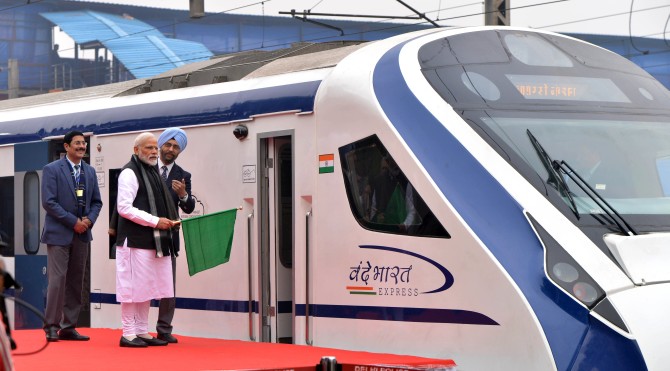
The much talked about Train 18, also known as Vande Bharat Express, was flagged off by Prime Minister Narendra Modi on February 15, 2019. The train was pitched by the Union Government as an achievement – the first semi-high speed intercity train in India, and a Make in India product. The inaugural run of the train, however, hit a snag. Two hundred kilometres outside Delhi, near Tundla in Uttar Pradesh, it broke down. It was claimed that this was due to the train running into cattle, though several accounts insist that there were no signs of damage to the train. There were also reports of foul smell in the train and smoke.
After the failed first outing, opposition leaders like Rahul Gandhi and Akhilesh Yadav demanded answers from the government. Gandhi tweeted, “Modi ji, I think Make in India needs a serious rethink. Most people feel it has failed. I assure you that we in the Congress are thinking very deeply about how it will be done.” The Prime Minister, while addressing a crowd at Varanasi, hit back at Gandhi and said that people who were “mocking” the Vande Bharat Express and Make in India programme should be “punished at the right time” for insulting India’s engineers and technicians involved in the project. He also claimed that he had been receiving letters from people who were “hurt” by such statements.
The irony of this response is striking. The ruling BJP-RSS combine, including Narendra Modi himself, has not only repeatedly ridiculed elected governments of the past 70 years and belittled their work; it has also spewed venom on a range of institutions built in post-independence India. A recurring target has been Jawaharlal Nehru’s legacy in education, science and technology. Through such vilification, the Narendra Modi government has sought to repackage basic goals and agendas of independent India, like industrial self-reliance, as gimmicky “path-breaking” programmes like Make in India.
The state of the economy, of course, gives the lie to all such gimmicks. Make in India has been spectacularly unsuccessful in meeting its goals. With NSSO Data leaked in January indicating that the unemployment rate in the year 2017-18 hit a forty-five year high, the promise of employment made by the BJP has been proved to be false. Narendra Modi’s claim, in this context, that selling pakodas amounts to employment is only salt on the wounds of the millions of unemployed.
Industrial self-reliance has clearly not been on the government’s agenda. One of the biggest controversies since the BJP came to power in 2014 has been the Rafale deal, where the government snatched massive and vital opportunities away from Hindustan Aeronautics Limited (HAL), and channelled them to Anil Ambani’s newly formed Reliance Defence Limited. The episode was a major blow to HAL and made a mockery of Make in India.
Science and technology were central to the project of self-reliance post-independence. Under the current dispensation, they have been the biggest casualties. As recently as January 2019, at the Indian Science Congress, academics with RSS leanings completely dismissed Einstein’s research on gravity and made the bizarre claims that Hindus invented stem cell research in ancient India. Last year, a BJP minister had dismissed the theory of evolution because “no one ever saw an ape turn into a human.” The Prime Minister himself had claimed in 2015 that plastic surgery existed in ancient India citing the example of the god Ganesha.
Narendra Modi’s invocation of Indian engineers and their efforts amounts to nothing more than cynical politicking. The threats of punishment are simply a continuation of the hallmark authoritarianism of his regime. In the run up to the elections one can expect further such nationalist bulldozing to hide governmental failure.




